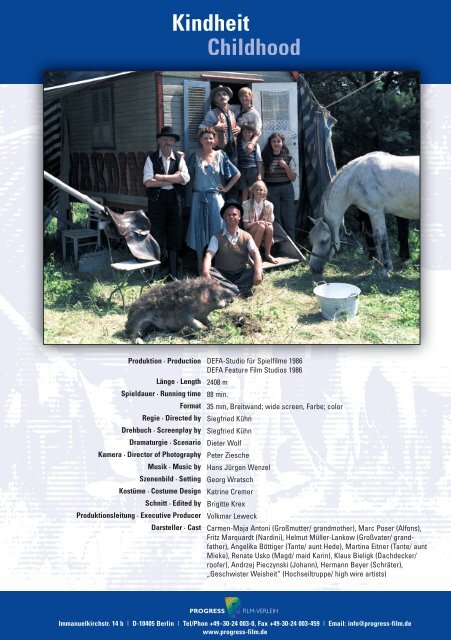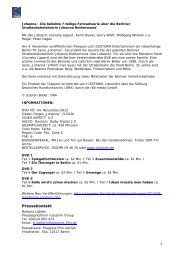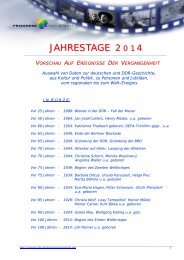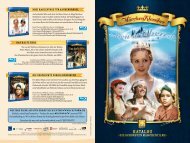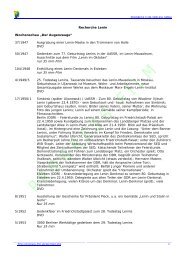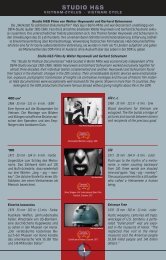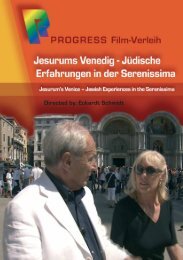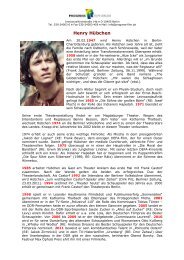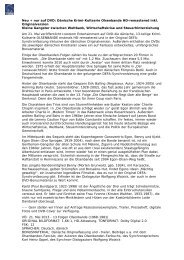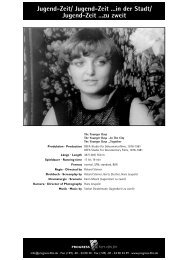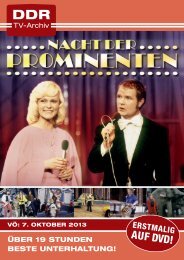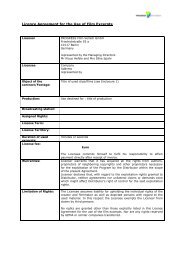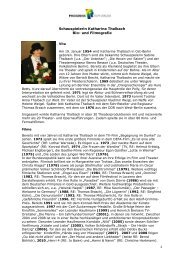DE_FB _4. Serie:* Layout Armin Mueller-Stahl - PROGRESS Film ...
DE_FB _4. Serie:* Layout Armin Mueller-Stahl - PROGRESS Film ...
DE_FB _4. Serie:* Layout Armin Mueller-Stahl - PROGRESS Film ...
Erfolgreiche ePaper selbst erstellen
Machen Sie aus Ihren PDF Publikationen ein blätterbares Flipbook mit unserer einzigartigen Google optimierten e-Paper Software.
Produktion · Production<br />
Länge · Length<br />
Spieldauer · Running time<br />
Format<br />
Regie · Directed by<br />
Drehbuch · Screenplay by<br />
Dramaturgie · Scenario<br />
Kamera · Director of Photography<br />
Musik · Music by<br />
Szenenbild · Setting<br />
Kostüme · Costume Design<br />
Schnitt · Edited by<br />
Produktionsleitung · Executive Producer<br />
Darsteller · Cast<br />
Kindheit<br />
Childhood<br />
<strong>DE</strong>FA-Studio für Spielfilme 1986<br />
<strong>DE</strong>FA Feature <strong>Film</strong> Studios 1986<br />
2408 m<br />
88 min.<br />
35 mm, Breitwand; wide screen, Farbe; color<br />
Siegfried Kühn<br />
Siegfried Kühn<br />
Dieter Wolf<br />
Peter Ziesche<br />
Hans Jürgen Wenzel<br />
Georg Wratsch<br />
Katrine Cremer<br />
Brigitte Krex<br />
Volkmar Leweck<br />
Carmen-Maja Antoni (Großmutter/ grandmother), Marc Poser (Alfons),<br />
Fritz Marquardt (Nardini), Helmut Müller-Lankow (Großvater/ grand -<br />
father), Angelika Böttiger (Tante/ aunt Hede), Martina Eitner (Tante/ aunt<br />
Mieke), Renate Usko (Magd/ maid Karin), Klaus Bieligk (Dachdecker/<br />
roofer), Andrzej Pieczynski (Johann), Hermann Beyer (Schräter),<br />
„Geschwister Weisheit“ (Hochseiltruppe/ high wire artists)<br />
Immanuelkirchstr. 14 b | D-10405 Berlin | Tel/Phon +49–30-24 003-0, Fax +49-30-24 003-459 | Email: info@progress-film.de<br />
www.progress-film.de
Ein niederschlesisches Dorf im letzten Kriegsjahr. Der neunjährige<br />
Alfons ist mitnichten ein armer Wurm, als er von seiner allein stehenden<br />
Mutter der großelterlichen Erziehung überlassen wird. Seine<br />
Großmutter Anna Maria Josephine Seipold ist ihm zärtliche und erfindungsreiche<br />
Mutter und Oma zugleich. Auf den Schultern der „Omamutter“<br />
lernt Alfons die ganze fantastische Welt kennen. Nach einem<br />
Unfall stirbt der Großvater und „Omamutter“ übernimmt auf die ihr<br />
eigene Weise das Regiment über den kleinen Bauernhof und seine<br />
bunte Gemeinschaft: Die Magd Karin, den als polnischen Gefangenen<br />
zugeteilten Fremdarbeiter Johann, Tante Mieke und die ausgebombte<br />
Tante Hede aus Breslau. Eines Tages kommt der Schausteller Nardini<br />
mit seiner Truppe ins Dorf und bringt nicht nur dort viel durcheinander.<br />
Die Großmutter und Nardini entdecken ihre Seelenverwandtschaft.<br />
Eine leidenschaftliche Beziehung entsteht, obwohl die Leute vom Dorf<br />
dem „Zigeuner“ mit immer größerer Feindseligkeit begegnen.<br />
Skurrile, von menschlicher Herzenswärme durchdrungene Kindheitserinnerungen<br />
des Regisseurs Siegfried Kühn. Herausragend<br />
Carmen-Maja Antoni in ihrer Rolle als emanzipatorische Großmutter,<br />
für die sie 1988 mit dem Kritikerpreis als beste Darstellerin ausgezeichnet<br />
wurde.<br />
Siegfried Kühn, geb. 1<strong>4.</strong> März 1935 in Breslau. 1958 Studium an der<br />
Deutschen Hochschule für <strong>Film</strong>kunst in Potsdam-Babelsberg.<br />
1959-1964 Regiestudium an der Moskauer <strong>Film</strong>hochschule (VGIK).<br />
1967 Regieassistent im <strong>DE</strong>FA-Studio für Spielfilme. 1969 Spielfilmdebüt<br />
„Im Spannungsfeld“. Mit „Das zweite Leben des Friedrich<br />
Wilhelm Georg Platow“ (1973) gelingt Kühn einer der interessantesten<br />
<strong>DE</strong>FA-<strong>Film</strong>e der 1970er Jahre. Ein internationaler Erfolg<br />
wird die Literaturverfilmung „Die Schauspielerin“ (1988) mit<br />
Corinna Harfouch in der Hauptrolle. „Heute sterben immer nur die<br />
andern“ (1990) mit Lebensgefährtin Katrin Saß in der Hauptrolle ist<br />
einer der letzten <strong>DE</strong>FA-<strong>Film</strong>e nach dem Zusammenbruch der DDR.<br />
<strong>Film</strong>e (Auswahl): „Im Spannungsfeld“ (1969); „Zeit der Störche“<br />
(1970); „Das zweite Leben des Friedrich Wilhelm Georg Platow“<br />
(1973); „Die Wahlverwandtschaften“ (1973); „Unterwegs nach<br />
Atlantis“ (1976); „Don Juan, Karl Liebknechtstr. 78“ (1979); „Romeo<br />
und Julia auf dem Dorfe“ (1983); „Kindheit“ (1986); „Der Traum<br />
vom Elch“ (1986); „Die Schauspielerin“ (1988); „Heute sterben<br />
immer nur die anderen“ (1990)<br />
„Herausragend Carmen-Maja Antoni als emanzipatorische Großmutter.“<br />
(Das Zweitausendeins <strong>Film</strong>lexikon in zweitausendeins.de, Stand 2009)<br />
„Poetisch-skurril ist dieser filmische Rückblick“<br />
(Berliner Zeitung, 10. April 2003)<br />
„Carmen-Maja Antoni konnte mit zuweilen spitzbübischer Miene eine<br />
Großmutter vorstellen, zu der die landläufige Vorstellung einer ‚0ma’ nicht<br />
paßt. … Überhaupt sind in diesem <strong>Film</strong> alle Komödianten… Ihnen und allen<br />
anderen folgt man mit viel Spaß auf den Erinnerungswegen des Erzählers.“<br />
(Hans-Jörg Rother in <strong>Film</strong> und Fernsehen, Nr. 2, 1988)<br />
Kindheit<br />
Childhood<br />
INHALT · STORYLINE<br />
A village in Lower Silesia during the last year of war. Nine year old<br />
Alfons is by no means to be pitied when he is handed over to his<br />
grandparents by his single mother. His grandmother Anna Maria<br />
Josephine Seipold is a loving and inventive mother and grandmother<br />
at the same time. On the shoulders of the “Grand-Mother”<br />
Alfons discovers the whole fantastic world. After an accident, the<br />
grandfather dies and the “Grand-Mother” takes over the small farm<br />
and takes care of the colourful community in her very own way: the<br />
maidservant Karin, the Polish prisoner Johann, assigned to them as<br />
a worker, aunt Mieke and bombed out aunt Hede from Breslau. One<br />
day the carnie Nardini and his company come to the village and<br />
cause some chaos. The Grandmother and Nardini discover that<br />
they are soul mates. A passionate relationship begins even though<br />
the villagers meet the “gipsy” with growing resentment.<br />
Childhood memories of director Siegfried Kühn, bizarre but full of<br />
affection. Carmen-Maja Antoni is outstanding in her role as an<br />
emancipatory grandmother, awarded with a critics’ award in 1988.<br />
BIOGRAPHIE <strong>DE</strong>S REGISSEURS · DIRECTOR’S BIOGRAPHY<br />
PRESSESTIMMEN · PRESS COMMENTS<br />
Siegfried Kühn, born in Wroclaw on March 14th, 1935. In 1958 he<br />
begins studying at the German <strong>Film</strong> Academy in Potsdam-Babelsberg.<br />
From 1959 to 1964 he takes directing classes at the Moscow<br />
<strong>Film</strong> Academy (VGIK). In 1967 Kühn works at the <strong>DE</strong>FA Feature <strong>Film</strong><br />
Studios as an assistant director. In 1969 feature film debut with “In<br />
The Field Of Tension” (Im Spannungsfeld). The tragicomedy “The<br />
Second Life Of Friedrich Wilhelm Georg Platow” (Das zweite Leben<br />
des Friedrich Wilhelm Georg Platow, 1973) is one of the most interesting<br />
<strong>DE</strong>FA films of the 1970s. The literary adaptation “The Actress”<br />
(Die Schauspielerin, 1988) starring Corinna Harfouch is an international<br />
success. “Nowadays Only The Others Die” (Heute sterben<br />
immer nur die andern, 1990) with his partner Katrin Saß as a leading<br />
actress is one of the last <strong>DE</strong>FA films after the collapse of the GDR.<br />
<strong>Film</strong>s (excerpt): “In The Field Of Tension” (1969); “The Time Of The<br />
Storks” (1970); “The Second Life Of Friedrich Wilhelm Georg Platow”<br />
(1973); “The Elective Affinities” (1974); “On The Way To Atlantis”<br />
(1976); “Don Juan, 78 Karl Liebknecht Str.” (1979); “Romeo And Juliet<br />
In The Country” (1983); “Childhood” (1986); “I Dreamed Of My Elk”<br />
(1986); “The Actress” (1988); “Nowadays Only The Others Die” (1990)<br />
“Carmen-Maja Antoni is extraordinary as the emancipatory grandmother.”<br />
(Das Zweitausendeins <strong>Film</strong>lexikon in zweitausendeins.de, as of 2009)<br />
“This cinematic retrospect is poetic-bizarre.”<br />
(Berliner Zeitung, 10. April 2003)<br />
“Carmen-Maja Antoni was able to enact a grandmother with such a mischievous<br />
face at times that the common idea of ‘nana’ doesn’t fit. … Anyways,<br />
everyone is a comedian in this film… You follow them on the memory<br />
paths of the storyteller with great pleasure.”<br />
(Hans-Jörg Rother in <strong>Film</strong> und Fernsehen, No 2, 1988)


